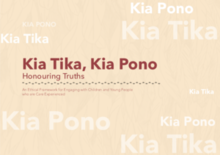This is an ethical framework to guide engagement with tamariki (children) and rangatahi (young people) who are care experienced (that is, who currently or at some stage in their lives have been in foster or residential care). Centring the voices and priorities of rangatahi with care experience, ‘Kia Tika, Kia Pono’ is intended for use by organisations and others working across the range of sectors and services that seek to engage tamariki and rangatahi who are care experienced in governance, policy making, service design, media or research. Its purpose is to ensure that these efforts are ethical, meaningful, and culturally safe. Grounded in Te Tiriti o Waitangi and participatory rights frameworks, ‘Kia Tika, Kia Pono’ is responsive to the cultural context of New Zealand. It is also distinctive in its centring of rangatahi with care experience as both knowledge-holders and knowledge-creators.
Kia Tika, Kia Pono was co-created by rangatahi/young people who are care experienced, staff members from VOYCE-Whakarongo Mai, and researchers from Waipapa Taumata Rau/ The University of Auckland and Te Rōpū Rangahau Hauora a Eru Pōmare, University of Otago (Wellington). It calls on adults seeking to engage with children and young people who are care experienced to ensure that their practice is tika and is pono: “the right people, doing the right things.” It also describes the elements needed to ensure that adults and organisations honour and respect children and young people who are care experienced and their contributions. Doing so requires processes that recognise these children and young people as expert leaders (rangatira) on their stories, lived experience and knowledge, uphold their mana, and add value to their lives.

